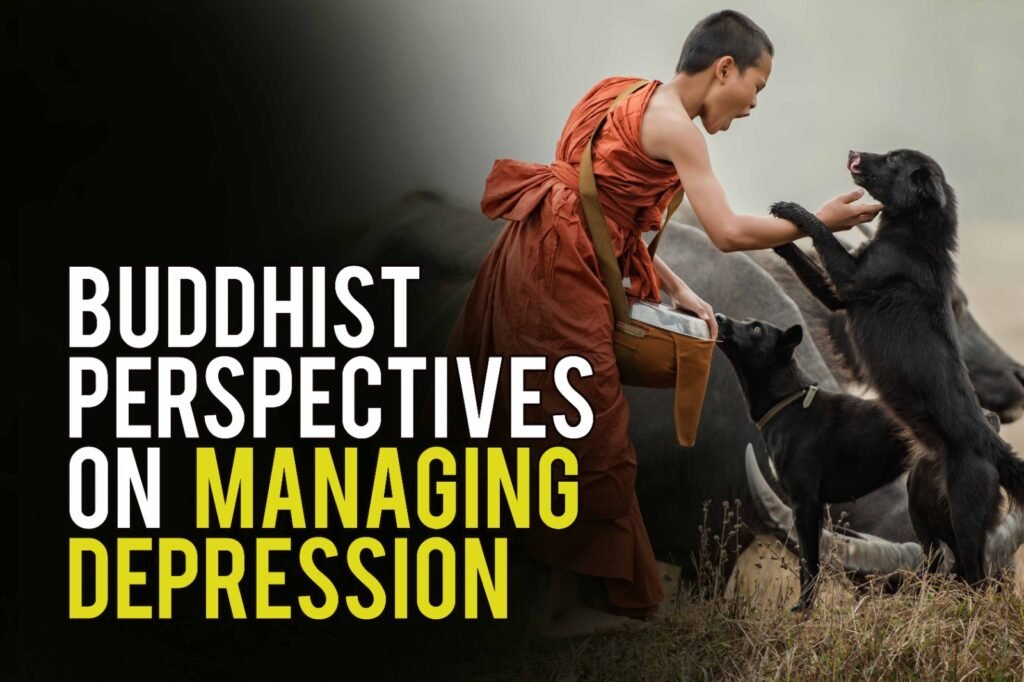Table of Contents
ToggleWe are living in a depression era. I am not exaggerating. Everyone knows facts can’t lie. The latest report from the World Health Organization (WHO) states that almost 280 million people all over the world are facing depression. For 4 to 5 years ago, or precisely speaking during covid- era, the term depression became a normal sickness, just like a fever that we experience now and then.
Depression is a mental illness that can seriously affect one’s thoughts, feelings, and behavior. Depression is a state of constant feeling of sadness; it makes us even more inefficient in doing daily tasks. People who suffer from depression have a loss of interest in everything around them. They lose concentration and express low- self-esteem.
Some of you may think that Buddhism and depression are an odd combination, especially because the term depression has become popular recently. The concept of Dukkha, otherwise known as suffering, is integral to Buddhism. The idea of Dukkha leads to despair and disappointment with the current life, which results in depression. Desire and ignorance are the major reasons that lead to human suffering.
The studies of Buddha always gave prime importance to the mental well-being of a person. In this blog, I am going to explore how the Buddhist perspective can manage depression.
Buddhism and Depression: The cause of suffering in Buddhism
“Attachment leads to suffering” – Buddha.
The concept of Suffering, or Dukkha, is the first noble truth of Buddhism. Suffering is an inevitable part that can’t be avoided. The foundation of every Dukkha is nothing other than craving and desire.
As human beings, we tend to attach ourselves to the impermanent things in our life. Attachment is important and Buddhism does not say about complete detachment. For the stable functioning of human life, one must maintain healthy attachments. We must be attached to the concept of being physically alive; if not, it will lead to suffering. So, in simpler words, fundamental attachments are necessary. Otherwise, it will lead to suffering. At the same time when these attachments become obsessive, it will also result in suffering.
Aversion is another reason for suffering. It refers to the feelings of anger, aggression, and hatred. When we experience aversion we dissociate with the things that we dislike. We always want to hate or dislike someone or something if we don’t understand it well. Ultimately, we end up hating stuff we don’t like, especially due to our ignorance. Instead of understanding, we cultivate hatred and conflict.
Likewise, impermanence also adds to the concept of suffering. Everything in our life undergoes decaying, including ourselves. Suffering originates from desires; these desires arise in the self. So, impermanence eventually results in suffering.
Buddhism suggests a solution to get rid of the suffering, it is through the practice of mindfulness.
Mindfulness is the easy way to achieve inner peace. The practice of mindfulness helps an individual to understand their own emotions. It helps to understand emotions without being judgmental about them. It also results in detaching from those emotions by understanding the impermanence of those feelings.
Mindfulness practice for curing Depression
A person who has depression can negatively impact the overall well-being of their mental health. It could reflect in their relationships, work life and personal life. Various physical symptoms give signs that you are depressed, such as sleep patterns, difficulty concentrating on work, changes in appetite, and making decisions.
When treating depression, one must approach it with a holistic attitude. It means one should give importance to the physical, mental, and social aspects of a human being that result in depression.
Meditation is one of the best mindfulness practices to decrease the degree of depression. Depressed people tend to have negative self-talk. One can cultivate self-awareness through mindfulness.
Memory loss and lack of concentration can happen to a person who is suffering from depression. Meditation as a remedy has the power to boost the memory and concentration of an individual.
Now, let’s look at the five major mindfulness breathing exercises for a calm mind.
1.Mindful Breathing
Mindful breathing involves focusing on one’s breathing. If you lose concentration, alert your mind to come back to the previous state and start to focus on inhaling and exhaling.
Benefits
- Eliminate distraction
- Release negative thoughts
- Improve self-awareness
- Help to quiet a racing mind
2.Counting Breaths
It is the practice of counting each breath. It is harder than you imagine.
Benefits
- Relax busy mind
- Eliminate negative emotions
- Lessen stress
- Reduce anxiety
3.Deep Breathing
Breathes fully into the belly first and then exhales completely.
Benefits
- Deactivate the stress response
- Reduce stress
- Promote a sense of calm
4.2-4 Breathing
It involves extending the exhale so it will be longer than the inhale. Then two counts of inhale and immediately exhale for another four counts.
- Reduce stress
- Promote relaxation
5.Energizing Breaths
Energizing Breaths include inhaling in four equal but separate segments to fill the lungs, then exhaling in one long, smooth segment to empty the lungs completely (repeat three or four times).
- Boost energy and alertness.
- Reduce stress
The role of compassion and self-compassion in depression
Self-criticism can intensify anxiety and depression by extending negative thought patterns and also results in reduced self-esteem.
Normally, individuals who are focused on self-criticism tend to engage in their flaws, mistakes, and shortcomings, often with a harsh and unforgiving attitude. This self-criticism cultivates feelings of insufficiency, worthlessness, and hopelessness, which are common features of both anxiety and depression.
Self-criticism results in constant worry and anxiety. It may lead an individual to question their self-worth. Depressed people often lose interest in their favorite activities.
Metta Bhavana, also known as loving-kindness meditation (LKM), is a Buddhist practice and it can increase the feelings of love, kindness, and compassion for oneself. This practice can help to develop a more connected and loving state of mind. The good part is that it can be practiced anywhere, at any time.
Let’s look at how to practice Metta Bhavana.
- Locate a comfortable place to sit or lie down
- Practice a few deep breaths
- Focus on a quality or trait you like about yourself
- Repeat positive phrases towards yourself, such as “May I be happy?”
- Replace “I” with “you” in the phrases and repeat them to others
- Visualize a light emitting from your heart and reaching out in all directions
We saw that self–criticism is part of depression. If we don’t believe in ourselves, or we are not impressed with ourselves, how can we expect that from the outer world? Buddhism in that scenario play an important role. Buddhism has the power to replace negative self-talk with positive self-talk. Validating your negative self-talk to understand whether this self-criticism could help you. First, you have to replace your self-diminishing thoughts with positive ones. Avoid speaking self-deprecating comments to yourself or while having a conversation with others.
The Buddhist Path to Attain Hope
We saw the role of Buddhism in managing depression. For a person who is facing depression, hope is something that they need to get through the journey. Here comes Buddhism and the integral concept of Impermanence, also known as Anicca. The idea of Anicca explains about temporal things of human life. Whether it is material things or mental things, everything changes in the of time. According to Buddha, there is no permanent self or no physical, and human desires or attachments are the reason for Dukkha.
According to Buddhism, human life aims to seek enlightenment. The major purpose of human life is to nurture an in-depth understanding of the nature of existence. More precisely, seeing reality as it is. The possible way to fulfill this goal is through variously developing the mind to refine its perspective of experience and existence. It can be done through the practice of meditation, which demands the right amount of concentration and mindfulness.
Overcoming Depression through Buddhism Therapy
Overcoming depression through Buddhism is the perfect method. It is not an easy way, but a better way. Mindfulness-based stress reduction is the Buddhist way of increasing vitality and sleep quality. It helps to minimize depression and anxiety.
The perfect way to improve self-awareness is mindfulness practice. It equips people to observe their thoughts and feelings without being judgmental about them. It allows them to get insight into their patterns and reactions. Cognitive behavioral therapy(CBT), which uses mindfulness techniques, helps individuals enhance self-awareness and emotional balance.
Our modern lifestyle can influence our mental health negatively. Many of you fail to give the right attention at the right time. The longer we are negligent of our mental health, the deeper the damage. Hope our blog, Buddhsim and depression, is an eye-opener to your mental health. Start today by taking the first step toward a healthier tomorrow. For more such interesting blogs, do visit our page Hidden Mantra.









